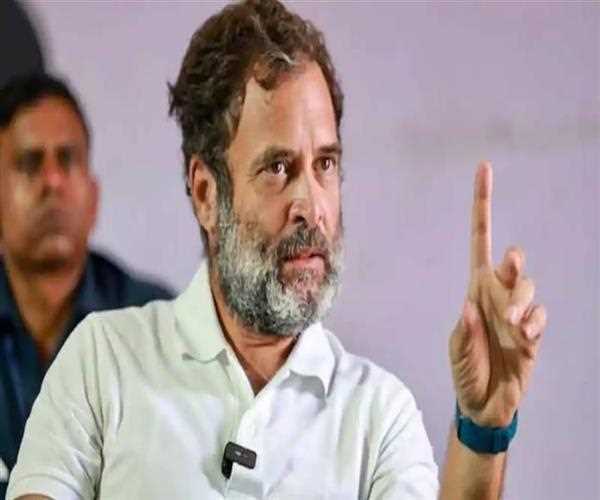
11-Mar-2023
Why Rahul Gandhi criticized Indian Prime Minister in his Cambridge speech
Predictably, there has been a lot of controversies over Rahul Gandhi's recent speeches abroad, at Cambridge University, and inside the British Parliament. Instead of oscillating between black and white polarities, his speeches need to be critically analyzed.
One thing is clear: For a foreign audience, washing a nation's internal laundry requires a great deal of nuance and sophistication. Within the nation, political parties may openly criticize and condemn one another, as is evident in our increasingly degraded political discourse. Because of how polarized our politics have become, some of it is bound to show up in speeches given abroad.
However, even if one is in the opposition, ultimately the nation's reputation and public image are at stake, so the same considerations must be made when traveling abroad. This does not imply suppressing the very different narratives about what India ought to be, but rather stating it in a manner that does not appear to be an unrelenting attack on the government of the country as a whole. The same criticism can be made by describing your "idea" of India and stating that this "idea" must be protected from any threat
Before taking such a course of action, it is necessary to state that India, like any democracy, is not perfect, that it still has a lot of room for improvement, and that it has repeatedly demonstrated that it is capable of resolving its own internal issues. To put it another way, what needs to be emphasized is that we will democratically settle our internal disagreements, even if we don't completely ignore the challenges.
This is due to pragmatic as well as ideological reasons. Practical because ordinary Indians, both in India and abroad, are offended by such vitriolic condemnation and do not want the country's image to be tarnished abroad, despite their dissatisfaction with many issues. Philosophical, on the grounds that nothing is totally awful or totally great. The expression of optimism and faith in the country's resilience and future, as well as the recognition of its strengths, should be added to criticism of the country because it sounds more credible, mature, and objective.
Therefore, Rahul Gandhi is saying goodbye to all nuance when he tells a foreign audience that Narendra Modi is "destroying the architecture of India" and "blowing the country to smithereens." Recalling the ideals that influenced the Congress party, the freedom movement, and the principles enshrined in the Constitution would be a much better approach. He could have stated that the Congress party would respond to any threat to the Constitution or individual citizens' freedom and liberty—the foundation of our democratic system—in accordance with the country's democratic framework. He could add, to give his own statement even more credence, that the Indian people fought and won against the Emergency when it was imposed in this setting.
Similarly, it is one thing to say that he and the Congress party will fight the erosion of institutions like the judiciary and media freedom, as the Bharat Jodo Yatra just demonstrated, and quite another to almost claim that they have disappeared, portraying India as a banana republic. As a diplomat, it was my professional responsibility to protect my nation's image. When I went into politics, I still spoke to foreign audiences, where I was less reticent about the issues that I was concerned about in the country. However, I never completely slammed the government and always started by stating that Indians can resolve their own conflicts while simultaneously reiterating that I have complete faith and hope in the country's future.
On other issues, Rahul appeared to be a thoughtful political leader. However, I found his analysis of China as a symbol of "harmony" and America as a symbol of "openness and individual liberty" to be a little too simplistic. He didn't mention the lack of democracy in China or the ongoing discrimination against people of color in America.
At long last, Rahul's rehashed utilization of the expression 'discussion', 'exchange' and the significance of a majority rules government, may ring a little empty in a party, where without holding any equitably chosen post, he is the true supremo, who gives off an impression of being threatening to any difference or analysis. Rahul Gandhi's attack on the Congress's so-called G-23 at the Congress Working Committee meeting was definitely not the best example of "conversation," "negotiation," or internal party democracy.
The BJP's response to Rahul was also predictable: to shield itself from criticism, it invoked patriotism and nationalism. However, the ruling party ought to be aware that no matter what Rahul said, the country's events cannot be concealed or ignored.

SEO and Content Writer
I am Drishan vig. I used to write blogs, articles, and stories in a way that entices the audience. I assure you that consistency, style, and tone must be met while writing the content. Working with the clients like bfc, varthana, ITC hotels, indusind, mumpa, mollydolly etc. has made me realized that writing content is not enough but doing seo is the first thing for it.
Join Our Newsletter
Subscribe to our newsletter to receive emails about new views posts, releases and updates.
Copyright 2010 - 2026 MindStick Software Pvt. Ltd. All Rights Reserved Privacy Policy | Terms & Conditions | Cookie Policy